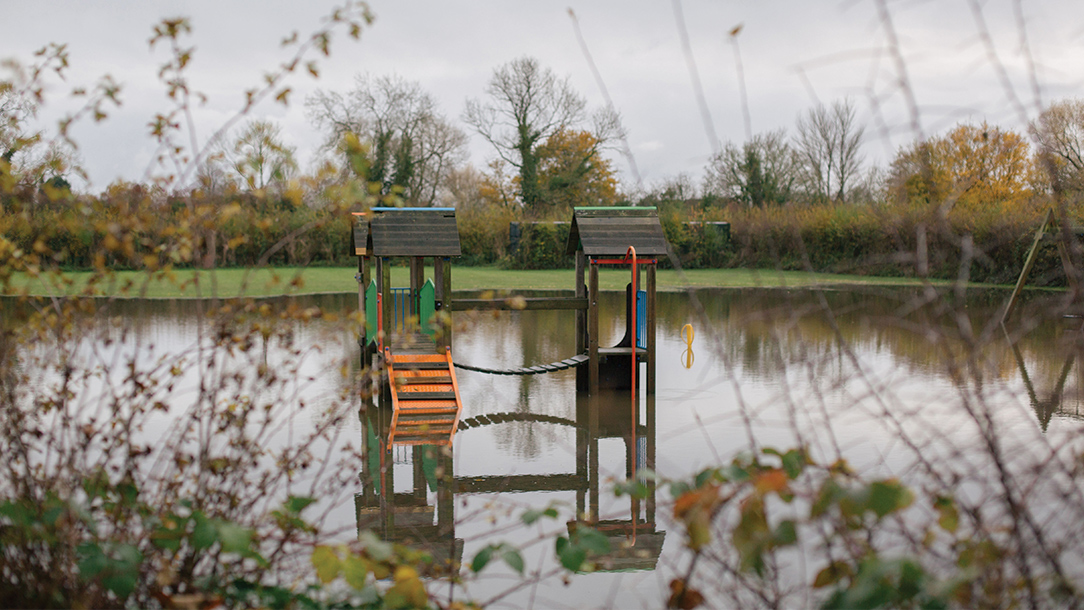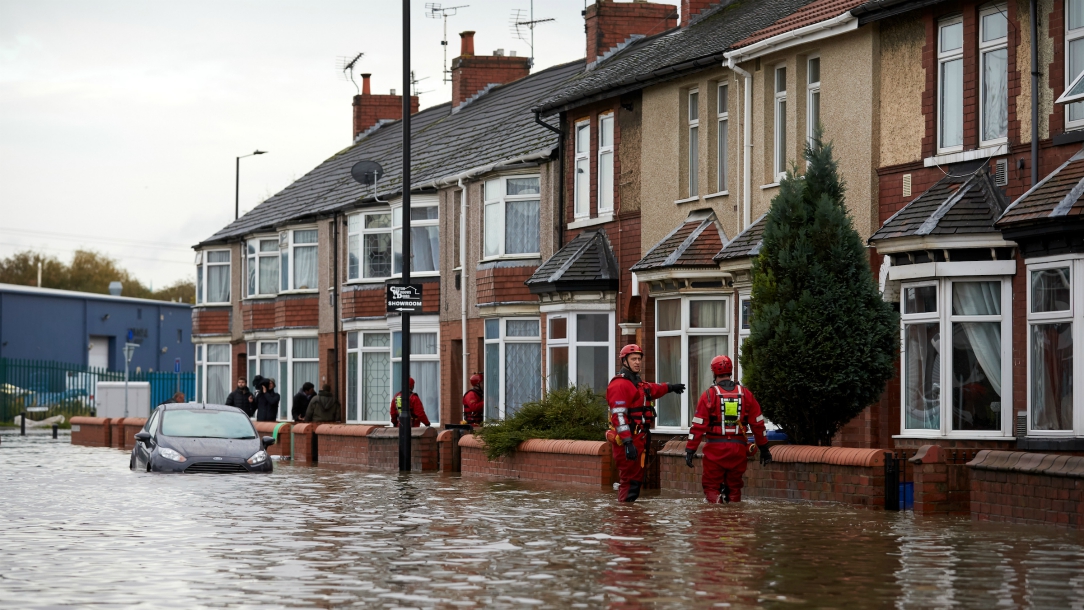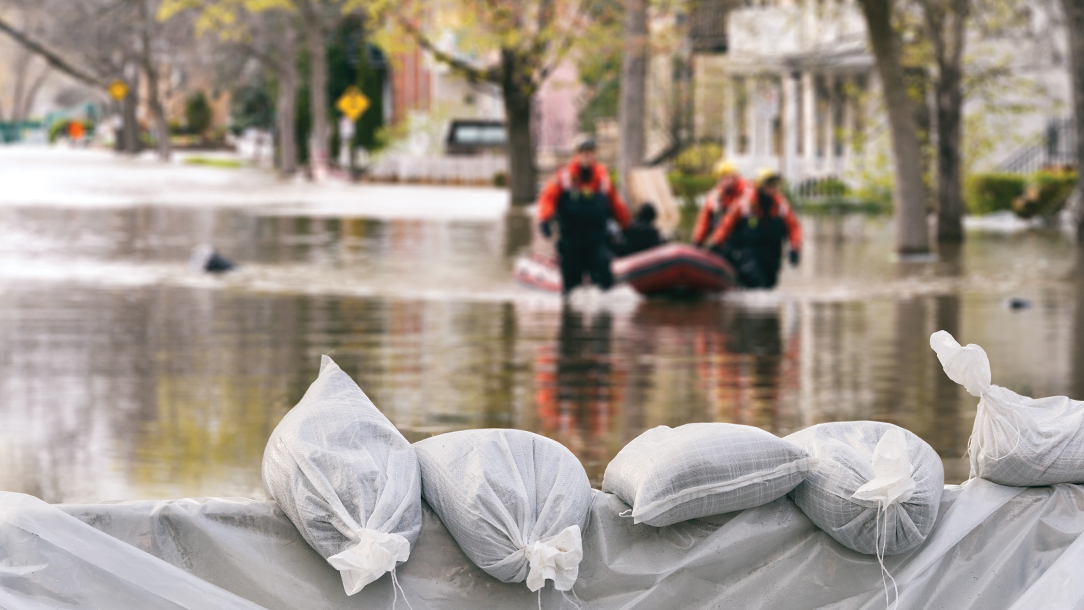What you need to know about floods in the UK
The risk of floods and flash floods is growing in England, Wales, and across the UK. Find out how to prepare your home and how the British Red Cross can help.

©David Severn/ British Red Cross
A children's playground stands in flood water in Fishlake, Doncaster.
1. What is a flood and what causes them?
Floods are the most common and widespread of all weather-related natural disasters to occur in the UK and overseas. Flooding happens when water overflows onto land that is normally dry.
This happens during heavy rain, when ocean waves come on shore, when snow melts too fast, or when dams or levees break. They are also common after a drought, when the ground is hard and dry, making drainage difficult. These are natural causes of flooding.
The Met office describes flash flooding like this: "when rain falls so fast that the underlying ground cannot cope, or drain it away fast enough. Roads can become like rivers and if there is a lot of water, it can flood buildings and carry cars away. So, if the rain is falling too fast for the ground or drains to cope, there is a risk of flash flooding."
Climate change, a growing population, and less green space are causing floods, according to the Environment Agency. Extreme weather events are four times more likely to happen now than in 1970. Since 1910, there have been 17 record-breaking months of rainfall. Nine of these have been since the year 2000.
Experts warn that flooding in the UK will be an increasing problem as towns and cities get bigger. When we build on areas of land near rivers and it rains a lot, the risk of flooding is high. Concrete cannot absorb the water if rivers overflow.
“Flash flooding happens when rain falls so fast that the underlying ground cannot cope, or drain it away fast enough." The Met Office

2. Why are floods a problem?
Flooding destroys homes, disrupts transport, and bankrupts businesses. It can overload sewers and contaminate flood water, spreading disease.
Six inches of fast-flowing water can knock you over, and two feet can float a car.
If extreme weather intensifies and river management and urban planning isn’t reviewed, we risk more flooding in the UK. The emergency services could be overstretched.
The effects of floods can leave people needing food, shelter, medication, clothing, and cash. Some may need help to return to work and transport to get there. The average cost to repair a flooded home is an eye-watering £30,000. And post-flooding insurance claims are often gruelling, as this podcast explains.
People whose homes, businesses, or communities have been flooded can need support for days, months, and even years. We know the public is not ready, either.
Our recent report suggests that a quarter of UK adults think they will be affected by a major emergency. Yet more than two-thirds (70%) admit that nobody in their household has taken steps to prepare for floods in the UK.
3. Why do floods happen after periods of hot weather and drought conditions?
While flooding can happen at any time of the year, it's likely that with increasing periods of dry and hot weather, we will experience more flooding in the summer months during periods of extreme heat. Heatwaves and hot weather, plus a lack of rain over a long period, lead to drought conditions.
This means the ground is very hard and baked dry. When heavy showers hit parched earth, the rainwater is absorbed at a much slower rate. The water can ‘sit’ on the surface. This can lead to surface run-offs, which can cause flooding.
Follow our advice on what to do before, after, and during a drought to make sure that you're prepared.

Experts believe flooding will increase in future.
4. Who could be affected by flooding in the UK?
Millions of people are at risk of flooding in the UK, both in urban and rural areas. Some people will live in a flood-prone area and so will have experience of flooding before. Scientists have warned that, as a result of climate change, flooding in the UK is becoming more frequent and affecting more people.
Dr Jess Neumann, a hydrologist at the University of Reading, told the Guardian in 2021: “Flooding from intense summer rainfall is going happen more frequently. No city, town or village is immune to flooding and we all need to take hard action right now if we are to prevent impacts from getting worse in the future.”
Flash floods can happen in areas of the UK that don't usually experience flooding and take you by surprise, for example, flash floods hit London in the summer of 2021. Flash floods are unpredictable and happen quickly, so it's important for us all to think about what actions we can take to be prepared.
For help and guidance about what to do before, during, and after a flood read our flood preparedness advice.
“No city, town or village is immune to flooding and we all need to take hard action right now." Dr Jess Neumann, hydrologist at the University of Reading
5. What do flood warnings mean?
Flood warnings are issued by the governments in England, Wales, Scotland, and Northern Ireland during heavy rainfall and are issued locally to areas affected.
- A flood alert means you need to prepare for flooding. Get a bag ready that includes your medicines and insurance documents. Regularly check your flood risk and sign up for flood warnings.
- A flood warning means you need to act – flooding is expected. You should do all the actions for a flood alert but also turn off your gas, water, and electricity. Take your things upstairs, and move your family, pets, and car to safety. Put up any sandbags or flood barriers if you have them.
- A severe flood warning means your life is at risk. Call 999 if you are in immediate danger. Follow the advice from the emergency services and make sure you have an emergency kit. Alert your neighbours. Avoid driving or walking through flood water.
Together we can be ready for floods in the UK
We are working alongside the government, the emergency services, and other charities to make plans to protect our homes, our livelihoods and the most vulnerable people in our communities from floods. But you can be ready too.
For the latest updates and advice on the current weather, please check the Environment Agency website and their Twitter feed.
Emergencies in the UK
If you’re inspired by what you’re reading on Stories, please consider donating to make sure we’re ready to spring into action.
Donate